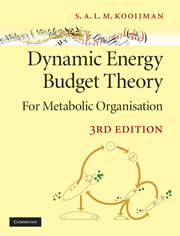Book contents
- Frontmatter
- Contents
- Preface
- 1 Basic concepts
- 2 Standard DEB model in time, length and energy
- 3 Energy, compounds and metabolism
- 4 Univariate DEB models
- 5 Multivariate DEB models
- 6 Effects of compounds on budgets
- 7 Extensions of DEB models
- 8 Covariation of parameter values
- 9 Living together
- 10 Evolution
- 11 Evaluation
- References
- Glossary
- Notation and symbols
- Taxonomic index
- Index
6 - Effects of compounds on budgets
Published online by Cambridge University Press: 05 June 2012
- Frontmatter
- Contents
- Preface
- 1 Basic concepts
- 2 Standard DEB model in time, length and energy
- 3 Energy, compounds and metabolism
- 4 Univariate DEB models
- 5 Multivariate DEB models
- 6 Effects of compounds on budgets
- 7 Extensions of DEB models
- 8 Covariation of parameter values
- 9 Living together
- 10 Evolution
- 11 Evaluation
- References
- Glossary
- Notation and symbols
- Taxonomic index
- Index
Summary
The uptake rate of food and/or limiting nutrients depends on their availability and the processing capacity of the individual. The uptake rate of non-limiting nutrients can follow the same pattern in multiple reserve systems, or can be linked to the uptake of limiting compounds in single-reserve systems; transitions between these modes will be discussed later. The uptake of non-essential compounds differs from that of essential ones by the absence of regulated use.
The first purpose of this chapter is to show how energetics interferes with many aspects of the uptake of non-essential compounds and how compounds affect metabolism. This chapter starts with the effects of reactive oxygen species (ros), a process known as ageing, and its links with energetics. After a brief introduction to other toxins and toxicants, the kinetics of non-essential compounds is discussed in terms of variations on the core model: a one-compartment model. Then follows a discussion of the inverse relationship, i.e. how compounds affect the energetics of individuals and the consequences for populations.
Effects of different compounds can be compared on the basis of parameter values. The covariation of parameter values is discussed in Chapter 8.
Ageing: effects of ros
The frequently observed correlation between life span and the inverse volume-specific metabolic rate for different species (see, e.g. [1022]) has guided a lot of research, see [350]. Animals tend to live longer at low food levels than at high ones, which couples ageing to energetics.
- Type
- Chapter
- Information
- Dynamic Energy Budget Theory for Metabolic Organisation , pp. 214 - 254Publisher: Cambridge University PressPrint publication year: 2009



